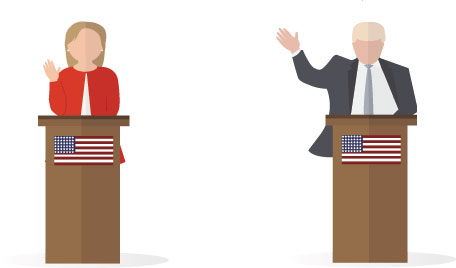How much will the presidential debates matter?
 ingibiork / Shutterstock.com
ingibiork / Shutterstock.com
We know from research and polling that debates have a limited effect on voting. Most people who watch the debates have already made up their mind—on average, about 90 percent of viewers will not change their preference following the debate. But among undecided, conflicted, or weakly committed voters, the debates really do matter, potentially solidifying weak commitments and even changing votes.
In 1978, S.H. Chaffee outlined four conditions under which debates might matter more: when one of the candidates is relatively unknown, when many voters are undecided, when the race appears close, and when party allegiances are weak. Although the first condition clearly doesn’t apply in 2016, at least two of the others, and possibly a third, do.
There are two to three times more undecided voters this year than in recent elections, likely due to high levels of dissatisfaction with both candidates. The race also appears close (at least for the moment). Finally, party identification is at historic lows, with more self-identified independents now than at any time since Gallup starting measuring them more than 25 years ago. Research even suggests that voters are ashamed of partisan politics and think it is cool to identify as independent.
Debates also matter in one other important way: An experiment by McKinney and Warner (2013) carried out through more than a decade of presidential campaigns shows that debates leave citizens more confident in their political knowledge and less cynical about politics in general—motivating political engagement and making them more likely to vote.
Scoring the debates
Despite the cottage industry in scoring candidates’ debate performances, several studies show that voter assessments are actually more influenced by pre-existing attitudes toward the candidates, parties, and the incumbent president.
In one recent study, Lanoue and Schrott (2012) were able to isolate the effects of performance in the debate itself from other factors. The result: Nonperformance factors—partisan identification, candidate preference, incumbency, and presidential popularity—collectively explain more about any change in voter preference following the debate than does the performance of the candidates.
And when looking just at performance in all presidential debates from 1960 to 2008, they find that candidates more often underperform than over-perform—that debates are typically lost rather than won. Put both these results together and it’s possible to “win” the debate without performing particularly well—with the media then amplifying the victory. It’s also possible to deliver a terrific performance only to enjoy a narrow win in post-debate polls because of pre-existing factors. The findings provide important perspective as the media casts winners and losers based on post-debate polling.
The debates and polarization
Other recent research offers more debate insight. McKinney and Warner (2013) show that presidential debates polarize attitudes, particularly among those who start out less polarized. This could be happening for two reasons. If voters lack sufficient information to make a choice or are simply apathetic, the debates could engage them and give them the information they need to decide. It could be, however, that voters are fully engaged and simply have not been able to make up their minds. If this is the case, the debates will likely reinforce a pre-existing view—likely negative in this election—about one or both of the candidates, an insight both candidates would do well to remember.
Using survey panel data from the first presidential debate in the 2008 election, Kevin Mullinix found that partisan attachments and interest in politics predict how voters evaluate debate performance. Partisanship influences what incoming information people accept and political knowledge help people argue against information that runs counter to their beliefs. After viewing the debates, Democrats should become more favorable toward Hillary Clinton while Republicans become less favorable. The same is true—in reverse—for Donald Trump.
Carah Ong Whaley, PhD, is a lecturer in the Department of Politics at the University of Virginia. She is currently teaching a course on the presidential election.